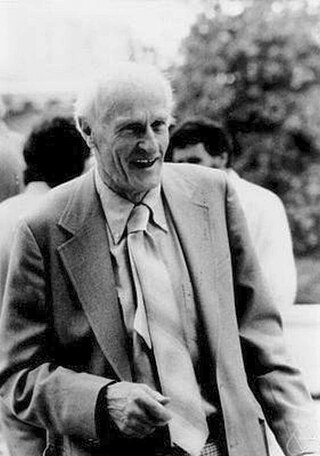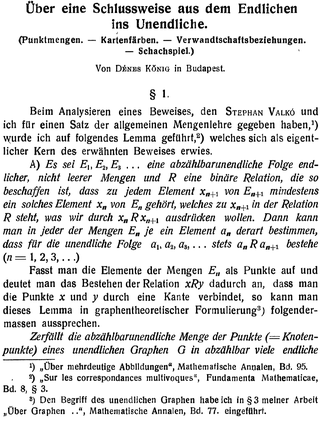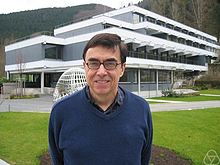Mathematical logic is the study of formal logic within mathematics. Major subareas include model theory, proof theory, set theory, and recursion theory. Research in mathematical logic commonly addresses the mathematical properties of formal systems of logic such as their expressive or deductive power. However, it can also include uses of logic to characterize correct mathematical reasoning or to establish foundations of mathematics.

Recursion occurs when the definition of a concept or process depends on a simpler or previous version of itself. Recursion is used in a variety of disciplines ranging from linguistics to logic. The most common application of recursion is in mathematics and computer science, where a function being defined is applied within its own definition. While this apparently defines an infinite number of instances, it is often done in such a way that no infinite loop or infinite chain of references can occur.

Stephen Cole Kleene was an American mathematician. One of the students of Alonzo Church, Kleene, along with Rózsa Péter, Alan Turing, Emil Post, and others, is best known as a founder of the branch of mathematical logic known as recursion theory, which subsequently helped to provide the foundations of theoretical computer science. Kleene's work grounds the study of computable functions. A number of mathematical concepts are named after him: Kleene hierarchy, Kleene algebra, the Kleene star, Kleene's recursion theorem and the Kleene fixed-point theorem. He also invented regular expressions in 1951 to describe McCulloch-Pitts neural networks, and made significant contributions to the foundations of mathematical intuitionism.
Gödel's incompleteness theorems are two theorems of mathematical logic that are concerned with the limits of provability in formal axiomatic theories. These results, published by Kurt Gödel in 1931, are important both in mathematical logic and in the philosophy of mathematics. The theorems are widely, but not universally, interpreted as showing that Hilbert's program to find a complete and consistent set of axioms for all mathematics is impossible.
In mathematics, Hilbert's second problem was posed by David Hilbert in 1900 as one of his 23 problems. It asks for a proof that arithmetic is consistent – free of any internal contradictions. Hilbert stated that the axioms he considered for arithmetic were the ones given in Hilbert (1900), which include a second order completeness axiom.

Kőnig's lemma or Kőnig's infinity lemma is a theorem in graph theory due to the Hungarian mathematician Dénes Kőnig who published it in 1927. It gives a sufficient condition for an infinite graph to have an infinitely long path. The computability aspects of this theorem have been thoroughly investigated by researchers in mathematical logic, especially in computability theory. This theorem also has important roles in constructive mathematics and proof theory.
Computability theory, also known as recursion theory, is a branch of mathematical logic, computer science, and the theory of computation that originated in the 1930s with the study of computable functions and Turing degrees. The field has since expanded to include the study of generalized computability and definability. In these areas, computability theory overlaps with proof theory and effective descriptive set theory.
Proof theory is a major branch of mathematical logic and theoretical computer science within which proofs are treated as formal mathematical objects, facilitating their analysis by mathematical techniques. Proofs are typically presented as inductively-defined data structures such as lists, boxed lists, or trees, which are constructed according to the axioms and rules of inference of a given logical system. Consequently, proof theory is syntactic in nature, in contrast to model theory, which is semantic in nature.
Reverse mathematics is a program in mathematical logic that seeks to determine which axioms are required to prove theorems of mathematics. Its defining method can briefly be described as "going backwards from the theorems to the axioms", in contrast to the ordinary mathematical practice of deriving theorems from axioms. It can be conceptualized as sculpting out necessary conditions from sufficient ones.
In computer science and mathematical logic the Turing degree or degree of unsolvability of a set of natural numbers measures the level of algorithmic unsolvability of the set.
In mathematics, Robinson arithmetic is a finitely axiomatized fragment of first-order Peano arithmetic (PA), first set out by Raphael M. Robinson in 1950. It is usually denoted Q. Q is almost PA without the axiom schema of mathematical induction. Q is weaker than PA but it has the same language, and both theories are incomplete. Q is important and interesting because it is a finitely axiomatized fragment of PA that is recursively incompletable and essentially undecidable.
In mathematical logic, second-order arithmetic is a collection of axiomatic systems that formalize the natural numbers and their subsets. It is an alternative to axiomatic set theory as a foundation for much, but not all, of mathematics.
In mathematics, Kruskal's tree theorem states that the set of finite trees over a well-quasi-ordered set of labels is itself well-quasi-ordered under homeomorphic embedding.
Primitive recursive arithmetic (PRA) is a quantifier-free formalization of the natural numbers. It was first proposed by Norwegian mathematician Skolem (1923), as a formalization of his finitistic conception of the foundations of arithmetic, and it is widely agreed that all reasoning of PRA is finitistic. Many also believe that all of finitism is captured by PRA, but others believe finitism can be extended to forms of recursion beyond primitive recursion, up to ε0, which is the proof-theoretic ordinal of Peano arithmetic. PRA's proof theoretic ordinal is ωω, where ω is the smallest transfinite ordinal. PRA is sometimes called Skolem arithmetic, although that has another meaning, see Skolem arithmetic.
In computability theory and computational complexity theory, an undecidable problem is a decision problem for which it is proved to be impossible to construct an algorithm that always leads to a correct yes-or-no answer. The halting problem is an example: it can be proven that there is no algorithm that correctly determines whether an arbitrary program eventually halts when run.
In proof theory, ordinal analysis assigns ordinals to mathematical theories as a measure of their strength. If theories have the same proof-theoretic ordinal they are often equiconsistent, and if one theory has a larger proof-theoretic ordinal than another it can often prove the consistency of the second theory.
In mathematical logic, true arithmetic is the set of all true first-order statements about the arithmetic of natural numbers. This is the theory associated with the standard model of the Peano axioms in the language of the first-order Peano axioms. True arithmetic is occasionally called Skolem arithmetic, though this term usually refers to the different theory of natural numbers with multiplication.
In proof theory, a branch of mathematical logic, elementary function arithmetic (EFA), also called elementary arithmetic and exponential function arithmetic, is the system of arithmetic with the usual elementary properties of 0, 1, +, ×, , together with induction for formulas with bounded quantifiers.

Slicing the Truth: On the Computability Theoretic and Reverse Mathematical Analysis of Combinatorial Principles is a book on reverse mathematics in combinatorics, the study of the axioms needed to prove combinatorial theorems. It was written by Denis R. Hirschfeldt, based on a course given by Hirschfeldt at the National University of Singapore in 2010, and published in 2014 by World Scientific, as volume 28 of the Lecture Notes Series of the Institute for Mathematical Sciences, National University of Singapore.




